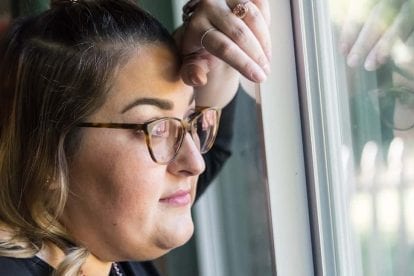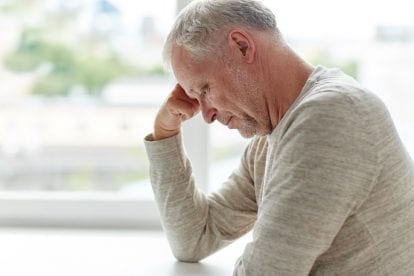Living With the Aftermath of Childhood Trauma: How I’m Surviving

More than two-thirds of kids experience at least one traumatic event by the time they turn 16. Between 25 percent and 43 percent of kids experience sexual abuse. As many as 85 percent witness community violence. These are just some of the ways a child may experience trauma. Childhood trauma has profound impacts on individuals, and the negative effects don’t simply go away with age. Many adults live with the complications of untreated past trauma. Professional mental health care, social support, coping strategies, and other factors can help anyone who went through trauma at a young age learn to survive and thrive.
After experiencing serious childhood trauma in an unstable home with substance use and poverty, it has taken me years to process the repercussions. As a child of trauma, there is no one to explain that you shouldn’t have to go through these things. I had to figure it out for myself.
Fortunately, as an adult, I found the help I needed. I got treatment for trauma, developed and nurtured a positive social support system, found meaning in my work, and learned how to process and live with my traumatic past.
The Causes ofChildhood Trauma
Anyone can experience trauma at any age, but children are particularly vulnerable. Trauma is not an event or series of events; it is an emotional reaction. A person may experience trauma after any situation or event that is frightening, extremely stressful, or life-threatening. You may only perceive it as life-threatening, but the experience can still be traumatic.
Not everyone goes through a difficult situation as a traumatic experience. Some cope well. Those who don’t may struggle with fear, anxiety, and difficult memories. They tend to have difficulty trusting others and may become numb or detached.
Childhood trauma can result from a single event, a series of events, or ongoing stressors. Some of the events or situations that may traumatize a child include:
- Physical or sexual abuse
- Emotional or verbal abuse
- Witnessing domestic or community violence
- Bullying
- Natural disasters
- Loss of a parent or other loved one
- Neglect
- Serious illness
- An unstable home environment
My Traumatic Experiences
As a young child, I suffered from an unstable home. Both of my parents struggled with addiction, mostly alcohol but sometimes drugs too. My father could never hold down a job, so food insecurity was typical. When he was in a bad mood and drunk, he often hit my mother.
My siblings and I did the best we could in the situation, but the repercussions of our parents’ instability were too much. In addition to the yelling, fighting, hitting, and sometimes the hunger, we also experienced neglect. We didn’t receive the degree of care or supervision that all children need and deserve.
We each coped in different ways. My older brother disappeared often, usually going to a friend’s house to escape. My sister became withdrawn and isolated. I lashed out. In high school, I started drinking. I used drugs. I had sex too, and put myself in a lot of risky situations. All of these things together created trauma that I have lived with ever since.
How My Childhood Experiences Affect Me Now
Childhood trauma causes emotional and even physical health problems that persist over time. For me, it started in adolescence. I felt unloved, neglected, and angry. Once I was old enough to be a problem, I made it my mission to make trouble for my parents. I stayed out as late as I wanted. I used drugs and drank. I hung out with a tough crowd.
Thankfully, I managed to graduate from high school relatively unscathed by my choices. But my struggles were far from over. I developed pretty serious depression and also had a lot of anxiety. I had a hard time being around a lot of other people. I preferred to remain isolated in college and later as well.
I never developed full-blown addictions like my parents, but up until just a year ago I did abuse alcohol. I used it as a coping mechanism when the bad feelings about the past began to creep into my mind. When anxiety threatened to overwhelm me, I would drink.
Another major issue I have struggled with is developing healthy relationships. I finally have a partner I trust and a small circle of close friends, as well as my brother and sister. It took a long time to get to this point, though, and to learn to trust people.
Call for a Free Confidential Assessment.
877-727-4343How I’ve Coped and Continue to Survive the Effects of Childhood Trauma
I have always survived my childhood trauma. I never felt like throwing in the towel completely, but it took me years to learn to survive in a meaningful way. These are the things that have helped me live with my past and to begin to actually thrive and enjoy life.
1. Getting Professional Treatment Was Essential.
I cannot overstate this. The single best thing I did to be able to live with my past was get professional mental health care. Ignoring past trauma doesn’t make it go away. The memories and terrible emotions associated with them only fester over time.
Depression was the main reason I initially went in for therapy. What my therapist helped me uncover were all the ways in which my childhood triggered feelings like depression, anxiety, and mistrust. When I realized the full extent of the results of my trauma, I decided to get more intensive treatment. The residential facility provided everything I needed to face my past, process it, accept it, and live with it.
2. I Built Better Relationships.
While my trauma treatment was so much about me, it also helped my relationships. My partner at the time, now my husband, engaged in the treatment process. He came to therapy sessions and went to support group meetings to learn more about how childhood trauma affects people.
His commitment to my wellness and our willingness to learn together how to communicate and build trust was so important. It helped me overcome a lot of hurdles to good relationships. I now have a close circle of friends and family I know I can turn to when things get difficult and when my past memories threaten to overwhelm me.
3. I Found Meaning in My Work.
Meaning in life doesn’t have to come from work, but for me it did. I work at a shelter for young adults who have aged out of the foster care system. It has been so rewarding—and good for my mental health—to be able to help these young people.
Meaningful work has taken me outside of myself and allowed me to focus attention and care on others. I have also been able to see other people trying to make their way in life after terrible childhood experiences. I can help them, but they also help me.
4. Focusing on Physical Health Keeps Me Well.
Physical and mental health are connected, as I learned in treatment. Taking care of my body along with my mind has helped me to remain grounded in wellness. Running several times a week lowers my stress and helps me think through difficult emotions. A good night’s sleep keeps me rested and recharges me.
I have also had to face my issues with alcohol. I stopped using it as a coping mechanism and now only drink occasionally. Drinking had kept me from being my best self, so it had to go for the most part. Without it, I feel better both physically and mentally.
5. I Stay Connected to People With Similar Experiences.
My work with young people has been an immense help, but I also get something out of support groups with other adults. Support meetings for trauma help me connect with people who understand me. They know what it’s like to go through something so terrible. We build each other up and provide a safe place to vent.
I also stay connected with my siblings. It took years for us to come back together, but I’m glad I did. They are truly the only other people who understand what I went through. They have healed in their own ways, and now we support each other.
Childhood trauma is out of the control of the individual child, but as an adult we can take our power back. I learned years later how to do that. Taking charge of my own mental health and facing my past head on has been life-changing in the best possible way.






